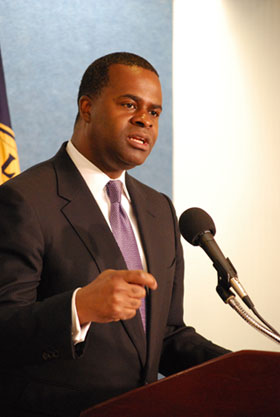
News
By Admin, May 6, 2011
Crossposted from Transportation for America's blog.

A supermajority of America’s mayors surveyed by the U.S. Conference of Mayors are clamoring for a reorientation in our nation’s transportation policy toward fixing what we have and investing in new options.
Ninety-eight percent of mayors identified affordable, reliable transit as crucial to their city’s recovery and growth, according to a survey of 176 mayors unveiled this week by Atlanta Mayor Kasim Reed (right) on behalf of the Conference.
Commanding majorities favor an increase in the federal gasoline tax, but only if more funding is allocated to transit, biking and walking, and local governments are given greater discretion over project selection. Eighty-percent said new highway projects should be a low priority, preferring to focus on repairing and maintaining what we have. Federal financing tools like Build America Bonds or the TIFIA programs receive the support of 75 percent of mayors.
The mayors also agree with T4 America that finding new revenue sources for a larger transportation bill without changing any policies is a non-starter. Just 7 percent of respondents said they would support a gas tax increase without a shift in priorities.
The mayors are in good company — 51 percent of voters in last year’s Smart Growth America poll identified “maintaining and repairing roads, highways, freeways and bridges” as their top priority, compared to 16 percent who chose expanding and building new infrastructure.
While the focus of the mayors’ attention is on the needs of metropolitan areas, most if not all of their policy preferences — increased local decision-making to meet local needs, reforms to the program, a broader array of travel options and a focus on fixing what’s already built — certainly apply equally to rural areas as well.
George J. Pierson, President and CEO of survey sponsor Parsons Brinckerhoff, put the results in perspective, noting that U.S. invests about two percent of GDP in infrastructure, compared to five percent in Europe and nine percent in China. He said:
When mayors in the United States speak to their need to improve the quality of roads and transit systems in their cities, they are responding to a public need in a way that will arm their cities for success in global competition.
You can read more about the survey at Streetsblog or the U.S. Conference of Mayors website.
Related News

© 2026 Smart Growth America. All rights reserved
Site By3Lane Marketing








